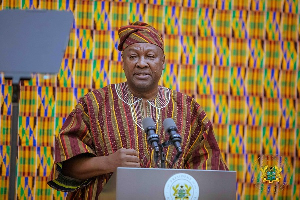Accra, March 19, GNA - President John Agyekum Kufuor, Chairman of the Economic Community of West African States (ECOWAS) on Friday said the Sub-Region had embarked on a new era of peace and stability. He said this was due to the successful management of conflicts in some member States and the removal of potential threats.
"These achievements have been made possible because of the unity of purpose and collective will for peace that we demonstrated at the height of the crisis", he said.
President Kufuor said this when inaugurating 14 out of the 15-member Third ECOWAS Council of Elders in Accra.
The Council with a year's tenure of office was established in July 2001 under Article 17 of the Protocol Relating to the Mechanism for Conflict Prevention, Management, Resolution, Peacekeeping and Security. It was established as an organ to assist ECOWAS Mediation and Security Council in the difficult task of restoring peace and stability to the Sub-Region.
Membership is made up of a representative from each Member State, and some of the missions undertaken by the Council, included election monitoring in Sierra Leone, Zimbabwe, the Gambia, Togo and Nigeria. Others are a fact-finding mission to Guinea Bissau and a mediation role in Liberia.
President Kufuor appealed to both the new and old members of the Council to assist each other by sharing experiences and maintaining the formidable esprit-de-corps that had proved highly beneficial to the Council in the past.
He said the new mandate of the Council was to help ECOWAS and its Mediation and Security Council to consolidate the hard-won peace and prevent the outbreak of new conflicts in the Sub-Region, adding; "I have no doubt that with co-operation and your individual talents this mandate can easily be executed".
To the members, President Kufuor said the call on them to serve was an acknowledgement of the wisdom and experience they possessed, which if properly applied to the Community's needs should engender some positive change in the lives of the citizens.
Dr Mohamed Ibn Chambas, Executive Secretary of ECOWAS, said the Protocol that established the Council defined their mission as one of preventive diplomacy and early warning to potential conflicts. He said the Council had carried out its mission by working closely with the Chairman of ECOWAS, Sub-Regional Leaders and various stakeholders in member States.
The Executive Secretary said since the inauguration of the first Council in Niger in July 2001, members had shown consistent availability, commitment and effectiveness in carrying out their duties in preventive diplomacy.
Dr Chambas said as facilitators, conciliators and arbitrators, members of the Council used their good offices in combination with traditional African conflict resolution methods to douse the flames of crises and thus prevented their escalation into conflicts.
"The Executive Secretary, also relies on the informed and wise counsel of the distinguished Council for appropriate decision making", he said.
Dr Chambas said the success of the Council in conflict resolution and election assistance had created hope that the Council should be more involved in the promotion of peace and security in the Sub-Region. He said as a result, the Executive Secretariat of ECOWAS was organizing a high level seminar to enable members of the Council to share experiences in conflict resolution.
Dr Chambas said it was expected that their experiences along with those of the Secretariat and other actors within and outside the Sub-Region involved in issues pertaining to peace and security, would lead to the strengthening of the current Protocol on Conflict Prevention, Management, Resolution, Peacekeeping and Security.
Nana Addo Dankwa Akufo-Addo, Minister of Foreign Affairs, said in view of the high cost of conflict management and resolution in human and material resources, ECOWAS was now laying greater emphasis on conflict prevention that hinged on two pillars, the Early Warning System and the Council of Elders.
He said for the Early Warning System, ECOWAS had set up an Observation and Monitoring System (OMS) that comprised a Centre at the ECOWAS Secretariat and four zonal bureaux.
The bureaux are located in Cotonou, Ouagadougou, Monrovia and Banjul with each covering three or four countries and are expected to collect, analyse and report data in a timely manner for decision-making. Nana Akufo-Addo, who is also the Chairman of the Mediation and Security Council of ECOWAS, said for preventive diplomacy, ECOWAS relied on members of the Council members, who were often the first to make contact with dissenting groups within Member States in trying to seek solutions to particular problems.
Mr Desmond Luke, a Member of the Council from Sierra Leone, on behalf of his colleagues said they were prepared to work for peace and development within the Sub-Region.
He said their efforts would not be fruitful without the full support and co-operation of ECOWAS.
Members of the Council are Mr E. M. Debrah from Ghana; Mr Bernardine Do Rego from Benin; Dr Ouidi Naba Douamba from Burkina Faso; Former President of Cape Verde, President Antonio Mascarenhas Monteiro and Mr Essienne Dieudonne from Cote d'Ivoire.
The others are, Alhaji John Biran from the Gambia, Mr Abdourahaman Sow from Guinea, Ms Eugenia Stevenson from Liberia, Mr Sira Diop from Mali, Mr Amirou Garba from Niger and former Nigerian President, General Abdulsalami Abubakar.
The rest are, Mr Mbaye Mbengue from Senegal and Mr Bitokotipou Yagninim from Togo. Guinea Bissau is the only Member State that has no representative on the Council.
General News of Friday, 19 March 2004
Source: GNA












